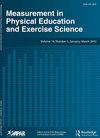Fundamental Movement Skills Proficiency and Their Relationship with Measures of Functional Movement and Health-Related Physical Fitness in Welsh Adolescents
IF 1.9
4区 教育学
Q2 EDUCATION & EDUCATIONAL RESEARCH
Measurement in Physical Education and Exercise Science
Pub Date : 2023-02-19
DOI:10.1080/1091367X.2023.2179402
引用次数: 0
Abstract
ABSTRACT The aims of this study were to determine the fundamental movement skill proficiency, functional movement competency and health-related physical fitness in a cohort of UK adolescents and to further examine if there were any relationships between these variables. In total, there were 178 participants aged between 11 and 13 years, 90 boys and 88 girls. Ordinal logistic regression analysis was used to investigate the relationship between FMS proficiency and functional movement competency and multi-factor ANOVA was used to explore the main effects of the FMS and the functional movements with health-related physical fitness responses. Overall, FMS proficiency and functional movement competency were classified as being low. In addition, positive relationships were found for several functional movements with specific FMS, and, for several functional movements and FMS with some measures of health-related physical fitness. In conclusion, further intervention of these variables is clearly warranted with this adolescent population in Wales (UK).威尔士青少年基本运动技能熟练程度及其与功能运动和健康相关体质测量的关系
本研究的目的是确定英国青少年队列的基本运动技能熟练程度、功能性运动能力和健康相关的身体素质,并进一步研究这些变量之间是否存在任何关系。总共有178名11至13岁的参与者,其中90名男孩和88名女孩。采用有序logistic回归分析探讨FMS熟练度与功能运动能力的关系,采用多因素方差分析探讨FMS和功能运动对健康相关体质反应的主要影响。总体而言,FMS熟练度和功能运动能力被分类为低。此外,还发现了几种功能运动与特定FMS之间的正相关关系,以及几种功能运动和FMS与一些健康相关的身体健康指标之间的正相关关系。总之,这些变量的进一步干预显然是必要的,在威尔士(英国)的青少年人口。
本文章由计算机程序翻译,如有差异,请以英文原文为准。
求助全文
约1分钟内获得全文
求助全文
来源期刊

Measurement in Physical Education and Exercise Science
Medicine-Orthopedics and Sports Medicine
CiteScore
4.20
自引率
33.30%
发文量
24
期刊介绍:
The scope of Measurement in Physical Education and Exercise Science (MPEES) covers original measurement research, special issues, and tutorials within six substantive disciplines of physical education and exercise science. Six of the seven sections of MPEES define the substantive disciplines within the purview of the original research to be published in the journal: Exercise Science, Physical Activity, Physical Education Pedagogy, Psychology, Research Methodology and Statistics, and Sport Management and Administration. The seventh section of MPEES, Tutorial and Teacher’s Toolbox, serves to provide an outlet for review and/or didactic manuscripts to be published in the journal. Special issues provide an avenue for a coherent set of manuscripts (e.g., four to five) to collectively focus in-depth on an important and timely measurement-related issue within the scope of MPEES. The primary aim of MPEES is to publish high-impact manuscripts, most of which will focus on original research, that fit within the scope of the journal.
 求助内容:
求助内容: 应助结果提醒方式:
应助结果提醒方式:


